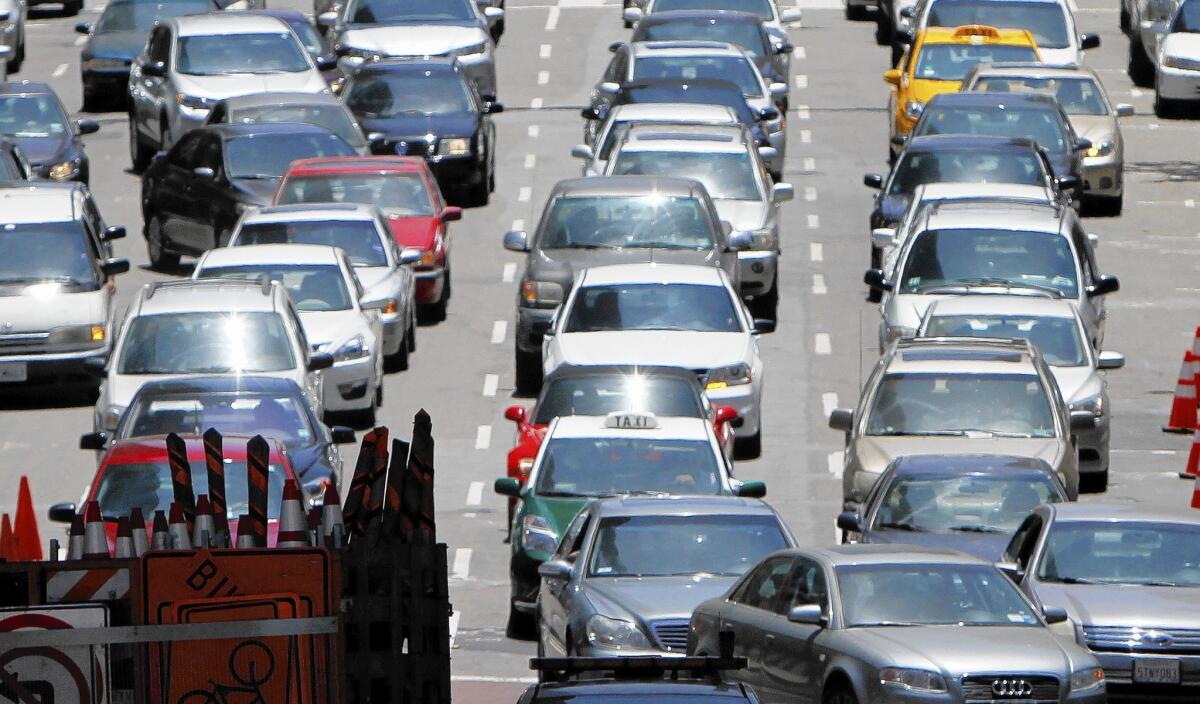Critics say climate program would create ‘hidden gas tax’

- Share via
Reporting from Sacramento — California’s latest move to combat global warming will either siphon dollars from motorists’ wallets or save them big money on their gasoline bills.
Those are the starkly different predictions being bandied about the Capitol by critics and fans of the state’s controversial system for buying and selling pollution credits. Starting Jan. 1, oil refineries must pay for the right to release excess carbon and other greenhouse gases to the atmosphere.
A bipartisan group of at least 40 members of the state Assembly last week wrote Gov. Jerry Brown and his environment secretary to complain that putting motor vehicle fuels into the program would create what some called “a hidden gas tax.”
They forecast that already high prices could jump by at least an additional 15 cents for regular gas, an increase that low- and middle-income Californians could ill afford. Lawmakers want Brown to exempt refineries from having to buy pollution credits.
Environmentalists counter that exempting the oil companies would send the wrong message to the industry and policymakers who have been watching the Golden State develop one of the most aggressive climate change programs in the world.
“Californians will spend a lot less on gas ... and breathe cleaner air,” said state Sen. Fran Pavley (D-Agoura Hills), author of AB 32, the landmark 2006 law that launched the effort.
Indeed, consumers already are saving money, experts say. The average car on the road is more fuel-efficient, thanks to changes brought by AB 32 and related state and federal laws and regulations.
Research released last week by the Consumer Federation of America found that average fuel economy of new cars increased by 20% in the last six years. The average owner of a 2014 model car would save $300 a year, compared with the owner of a 2008 model.
Any AB 32-related gas price hikes, said Max Baumhefner, an attorney with the Natural Resources Defense Council, will be “balanced out by efficiencies that lower the total” fuel costs.
Hello, Texas
State Sen. Ted Gaines is taking the fight for jobs to the Lone Star State.
The conservative Republican lawmaker will be in Austin and Dallas on Monday to tell Texas business executives that “California is an innovative, creative, entrepreneurial state that has a good message to deliver.”
Gaines’ trip comes a few weeks after Texas Gov. Rick Perry made his latest visit to California to crow about Toyota Motor Corp.’s decision to move its U.S. headquarters to Plano, Texas, from Torrance. Perry also said he is working hard to persuade California-based Tesla Motors Inc. to build a new electric car battery factory in Texas.
“I don’t have any issue with the governor,” said Gaines, who is running for state insurance comissioner. “I have an issue with creating jobs in California and doing everything I can as a legislator to do that.”
Gaines wants to pass urgent incentive legislation to bring the 6,500 Tesla jobs to California.
Twitter: @MarcLifsher
More to Read
Inside the business of entertainment
The Wide Shot brings you news, analysis and insights on everything from streaming wars to production — and what it all means for the future.
You may occasionally receive promotional content from the Los Angeles Times.











